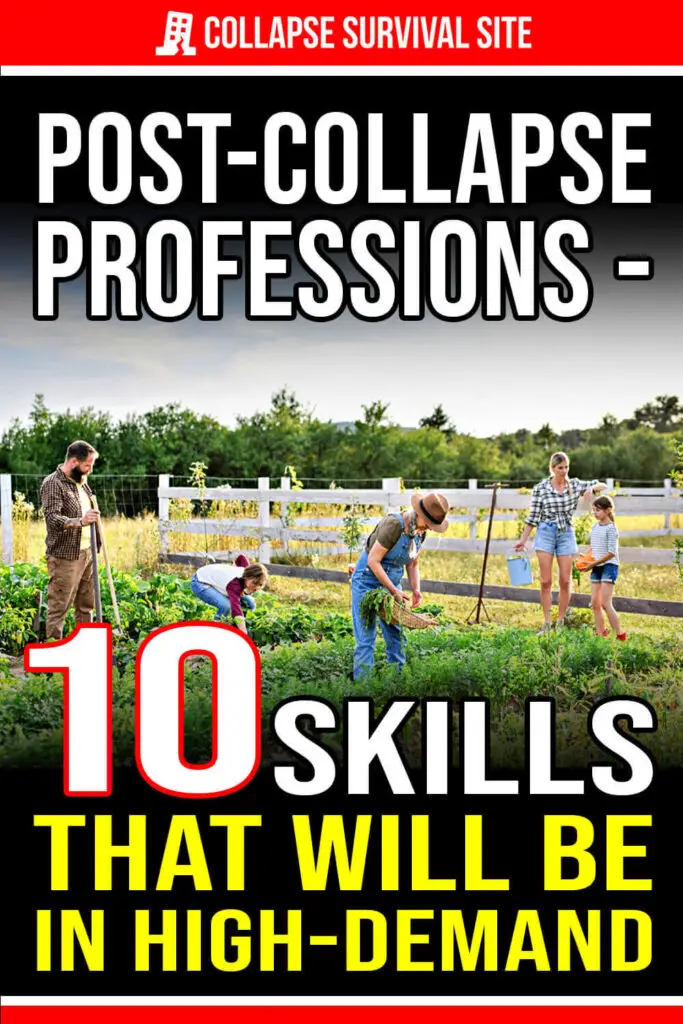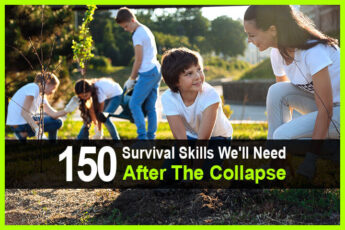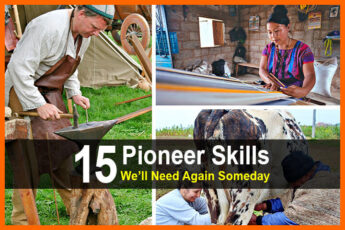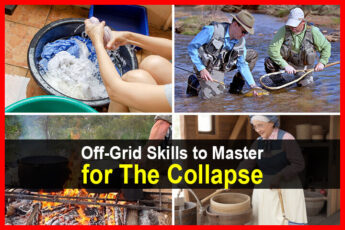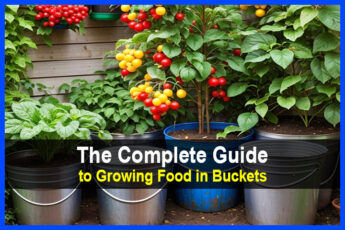Estimated reading time: 10 minutes
In a perfect storm of economic, environmental, and political turmoil, society can collapse leaving many without the means of sustaining themselves. Groups of people will then gather together in hopes of rekindling some semblance of the society that existed.
Just because you can’t do everything doesn’t mean you don’t have any skills to contribute. Without commonly found amenities, a community will need the combined skills of the group to succeed.
Some skills are more effective than others in a post-collapse society. For example, you won’t necessarily need an accountant to do your taxes. But there will be a need for a cook, a gardener, and many other skills that you can easily learn starting today.
Before we take a look at the specific invaluable skills needed to start over we should realistically gauge how severe the tipping point is and the potential fallouts that can occur.
Want to save this post for later? Click Here to Pin It On Pinterest!
What Would a Post-Collapse Community Look Like?
In the event of a societal collapse, there is a little bit of a gray area where we don’t know how severe it will be. There is a consensus that the vast majority of the population won’t be able to support themselves, but that’s about it.
There will be little pockets of sustainability as people pool their resources and come together. In that sense, we won’t revert to a completely primitive state. Keep in mind that this only takes into account the collapse of cities and governments.
As long as there isn’t a cataclysmic event, we should still have the technology and means to run it.
In the event of a seriously violent Earth-wide event, such as a volcano erupting, an electromagnetic pulse, or a meteor hitting us, things will start to get trickier to navigate. Many nations have experienced a societal collapse in some manner and have bounced back within a couple of generations.
The best example to come to mind would be the nuclear bombs that were detonated in Japan in 1945. The country went through an excruciatingly hard time but persevered regardless. They are now incredibly prosperous and have preserved their culture.
For this particular scenario, we can imagine a large amount of damage both in infrastructure and the economy. You won’t have access to resources such as gas and oil. Food supply will dwindle or be nonexistent as factory farms are destroyed. There are no supply chains to restock the shelves.
There will be no healthcare facilities to help the injured. Medicine will be in short supply and hoarded by those who thought ahead to prepare.
Furthermore, there will be no formal organization, things will be chaotic. People will find sanity in small groups as they come together to try and keep going. The chaos will be seen on a massive scale.
But only for a short time
Humans are resilient and after the initial collapse, those who are prepared will be able to utilize their alternative sources of energy, and share skills with others. The necessity of living will bring citizens together for a common cause.
Small communities will flock together, some will wander, while large families will most likely form their groups.
Gone will be the days of money, which will be replaced by something more valuable. The knowledge and skill set to contribute to a greater cause out of necessity and nothing else.
The only wealth you will have post-collapse is the skills you bring to the table to fulfill the needs for human survival. Technology breaks down and structures will crumble but passing on knowledge and experience is the key to survival.
10 Invaluable Skills That Will Benefit Your Community
In the new hands-on world, you can utilize these 11 skills to help sustain yourself and the community you happen to find yourself in. A lot of them you can incorporate into your existing day-to-day life, making them a little less grueling to learn.
Gardening
Probably one of the most important skills to have post-collapse is gardening. Any skills that are used in food production but this one in particular will help you create a sustainable source of food.
Not only can gardening create food for you and the community, but it can also be used for bartering. This enables you to trade your food for other items that you might need.
Over and above the obvious feeding element of gardening, producing and preserving seeds is important for the years following when growing conditions might not be optimal. Seeds can also be used in trade for other goods.
Animal Husbandry
Animal husbandry is the act of raising livestock for meat, milk, eggs, and other products. The process is not limited to raising, daily care, breeding, and butchering.
In a post-collapse world, it will be difficult to get food for your livestock so it’s important to pay close attention to their diet. For example, if you learned some gardening skills to grow veggies then you can use the biowaste to help feed your livestock.
Construction/Handyman Skills
As power tools and computer-guided machines stop working, hand tools will have to be used instead. Without the aid of modern conveniences, construction skills will be invaluable. Even minor skills such as measuring, knowledge of tools, and basic structural experience will go a long way.
You will have to repair existing structures or build new ones in a post-collapse scenario. Even the most basic of structures, such as an outhouse, will need to be built. Carpentry in particular will be a huge asset since wood may be the only plentiful resource around for you to work with.
Hunting/Foraging/Fishing
Unfortunately, grocery stores are more than likely out of commission so you won’t be able to go to your local meat aisle for steak.
For hunting, you want to learn skills such as wilderness tracking, field dressing, and trapping. If you don’t have hunting gear available then you will want to learn how to craft your own in the wilderness. You must be able to hunt animals to provide food and furs for your community.
Fishing is another great skill to learn and fishing rods are inexpensive and durable. You’ll want to learn how to create hooks, how to create your rod, and techniques on how to clean fish. You might want to check out what species are in the area that you reside in and keep some notes on what fish you shouldn’t be eating.
Foraging is a great skill to have, simply because it’ll keep you from eating something bad for you and getting sick. Knowing the edible flora in your area can provide insight into the food and natural medicine that might be available.
Additionally, knowing what plant species are in the vicinity can help you hunt since it will tell you what kind of animals might be roaming around. For example, rabbits love the new tender shoots of low-lying plants and you can often see their diagonal nibbles on the tips of branches.
Herbology/First-Aid
Medicine will be in short supply or nonexistent, leaving people vulnerable to a plethora of health hazards post-collapse. Natural medicine has seen a resurgence in the last few decades and for good reason, without society, we have no medicine.
Most people won’t know how to create their own medicine let alone diagnose their maladies. Short of becoming a pseudo witch doctor, learning about growing your own herbs and foraging those from the environment will be vital for a community.
Over and above that, basic first-aid skills should be acquired by everyone. This includes stitching, setting breaks, managing burns, and cleaning wounds. Basic anatomy knowledge can help with diagnosing internal issues. There’s a reason why doctors in small tribes are often held in high regard and it’s for their knowledge of healing.
Sewing
Once the clothing stores have been emptied you will be hard-pressed to find replacements. You won’t be able to order anything online and more than likely will be stuck with what you already own. Learning how to mend your clothing will become vital in a world where you can’t buy more.
This doesn’t mean that you’ll need to go and learn how to use a sewing machine (you probably won’t have the power for it anyway), but simple repairs with a needle and thread are well within your grasp. Once you learn the basics then it becomes easier to work with patterns and materials to create new clothing, should you need it.
Off-Grid Cooking/Preservation
There is no sense in learning how to provide food if you don’t know how to cook it or preserve it for long-term storage. Most people take cooking for granted since they can use a microwave or air fryer to do the cooking for them.
Once you realize that you’ll need to build your own oven or smokehouse then the reality of the situation gets a little more serious. Luckily, these kinds of skills are easy to learn and test out in your backyard.
Just like in a household, the kitchen is where the community is going to gather for nourishment and morale. Having someone around who knows how to make food items edible sustains people in more than one way.
Food preservation methods are important to learn, especially if you have more food than you can eat. For meat, you can learn how to cure, smoke, or dry it to create shelf-stable food for learning times.
Pickling is great for veggies and the ingredients you need are minimal. Food preservation will be vital in a time with no refrigeration or freezing capabilities.
Sustainable Energy
There is a large chunk of the world currently using sustainable energy sources such as wind, solar, and hydroelectric. In a post-collapse scenario, you will most likely still run into people with these energy-producing devices. Small pockets will still have portable solar generators or even panels set up and connected to batteries.
With the right skills, you may be able to scavenge solar panels and other equipment off of existing infrastructure. There’s even a video here explaining how to make solar panels out of old CDs and a picture frame.
It’s smart to know how these forms of renewable energy function so that you can safely connect the wiring and help provide power to your community. Once you have the power you can recharge things like flashlights, two-way radios, and other small electronics that you may want to use.
Mechanics
Mechanical skills, specifically expertise in small engine repair, will be crucial as a post-collapse profession. You can utilize this expertise to work on vehicles and farm equipment. Simple mechanics can also be applied to equipment powered by humans and not fuel.
Once fuel sources become scarce then even knowing simple bicycle mechanics can become a tradable asset. Knowing how to create and fix a mode of transportation can expedite travel and provide a quick means of transportation in a getaway situation.
Crafting Candles and Soap
Luxury items will be few and far between meaning they will be highly tradable. Candlemaking is a valuable skill as it provides a source of light and heat using materials that you don’t have to buy. In an age where batteries will die and not be replaced, a candle will be the inevitable replacement. If you can find a colony of bees there’s a chance you can harvest the wax to turn into candles.
Everybody will need to wash themselves at some point and they can’t exactly go to the store to buy soap. Primitive soap-making techniques are still practiced today and can be made using the ashes out of a firepit. Since you can make soap in large quantities, using them as a trading item will be an asset.
Final Thoughts
Many of these invaluable skills are a life-long journey to master them; However, you can still learn the basics with a little time and dedication.
If you noticed a pattern with these skills, congratulations. They are all designed to make you self-sufficient without relying on modern conveniences. That is the secret to surviving in a new world where everything needs to be earned.
Lastly, it is probably in your best interest to start gathering a library of reference materials to help you retain the skills you’re learning. Get prepared by stepping outside of your comfort zone before the tipping point of collapse arrives.
Like this post? Don't Forget to Pin It On Pinterest!


